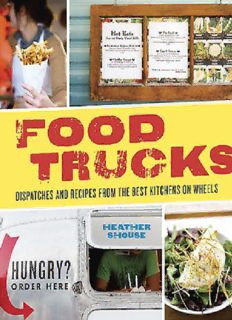
Food Trucks: Dispatches and Recipes from the Best Kitchens on Wheels PDF
Preview Food Trucks: Dispatches and Recipes from the Best Kitchens on Wheels
Main food/location photography copyright © 2011 by Leo Gong Illustrations and maps copyright © 2011 by Sarah Watts Food/location photography: Leo Gong: fm.1, toc.1, toc.2 (Tanguito), ack.1, itr.1, itr.2, itr.2, 1.1, 1.2, 1.3, 1.4 (Cemitas Poblanas Junior’s), 1.5, 1.6 (top row: Tacos Arturos; middle row: Cemitas Poblanas Junior’s; bottom row: Cemitas Poblanas Junior’s, Mariscos 4 Vientos #3), 1.7 (top row: Mariscos Jalisco, Tacos El Korita; bottom row: Mariscos Jalisco, Mariscos 4 Vientos #3), 1.8, 1.9, 1.13, 1.14 (Sam’s Chowdermobile), 1.15, 1.16, 1.17, 1.18, 1.19, 1.20, 1.22, 1.23, 1.24, 1.25, 2.2, 2.12 (Perierra Creperie), 2.13 (Perierra Creperie, Nong’s Khao Man Gai), 2.14, 2.15, 2.16, 2.19, 2.20, 2.21, 2.22, 2.22, 4.1, 4.2 (GastroPod; middle two), 4.4 (Odd Duck), 4.5, 4.6, 4.7, 4.8, 4.9, 4.10, 4.11, 4.12 (left), 4.13, 4.14, 4.15 (left), 4.16, 4.17, 4.18, 4.19, 4.20, 4.22, 4.26 (Yellow Submarine), 4.27 (GastroPod), 4.28, 4.29, 4.30, 4.31, 5.1 (Trini Paki Boys Cart), 5.2 (Magic Carpet, The Arepa Lady), 5.3 (Big Gay Ice Cream Truck), 5.4 (Jamaican Dutchy), 5.5 (The Arepa Lady), 5.7, 5.8, 5.9, 5.10, 5.11, 5.12, 5.13, 5.14, 5.15, 5.18, 5.19 (left), 5.23, 5.24, 5.25, 5.26, 5.27, 5.28 Heather Shouse: 1.21, 1.26, 1.27, 1.29, 1.30, 1.30, 1.31, 1.32, 2.1, 2.3 (Maximus/Minimus), 2.4 (Halláva Falafel), 2.6, 2.7, 2.8, 2.9, 2.11, 2.17, 2.18, 3.1 (bottom), 3.2 (top left, bottom), 3.3, 3.5 (Gaztro-Wagon), 3.6 (Hummingbird Kitchen), 3.12, 4.3 (The Best Wurst), 4.12 (right), 4.15 (right), 4.21, 5.6, 5.19 (right), 5.20, 5.21, 5.22, 5.29, 5.30 (Sâuçá; left), 5.34, 5.35, 5.36, 5.37 Sarah Watts illustrations and maps: 1.28, 2.23, 2.24, 3.10, 3.11, 5.16, 5.17 Additional photography and illustrations courtesy: Eric Shin (Kogi) pages: 1.9, 1.10, 1.11, 1.12 Sean Flanigan (Skillet) pages: 2.1, 2.5 Tracey Marshall (Marination Mobile) page: 2.10 James Meierotto (Fresher than Fresh) pages: 5.33 (center), 3.8 Steve Offutt (Fresher than Fresh) pages: 5.33 (bottom), 3.2 (top right), 3.7 Lindsay Laricks (Fresher than Fresh illustrations) page: 3.6 Taylor Castle (All Fired Up) page: 3.4 Scott Baitinger (Streetza) page: 3.9 Adam Bork (Food Shark) pages: 4.1, 4.23, 4.24 Briana Brough for Durham Magazine (Only Burger) page: 4.2 Andy Cook (Que Crawl) page: 4.25 Aung Zaw Lyn, Maret School (Fojol Bros.) pages: 5.30, 5.31, 5.32 Brian Tropiano (Food Chain) page: 5.33 Avishay Artsy (Fresh Local) pages: 5.34, 5.35, 5.36 All rights reserved. Published in the United States by Ten Speed Press, an imprint of the Crown Publishing Group, a division of Random House, Inc., New York. www.crownpublishing.com www.tenspeed.com Ten Speed Press and the Ten Speed Press colophon are registered trademarks of Random House, Inc. Library of Congress Cataloging-in-Publication Data is on file with the publisher. eISBN: 978-1-60774-065-0 First Edition v3.1 Introduction WEST COAST & PACIFIC Los Angeles, California San Francisco, California Oahu, Hawaii PACIFIC NORTHWEST Seattle, Washington Portland, Oregon MIDWEST Chicago, Il inois Kansas City, Missouri Milwaukee, Wisconsin Madison, Wisconsin Minneapolis, Minnesota SOUTH Austin, Texas Marfa, Texas New Orleans, Louisiana Durham, North Carolina Miami, Florida EAST COAST New York, New York Philadelphia, Pennsylvania Washington, D.C. Portsmouth, New Hampshire Index ACKNOWLEDGMENTS Thanks to Alexandra Sheckler for being the best research assistant I could have asked for; to my agent Jane Dystel for believing in my talents; to my editor Melissa Moore for her patience and persistence; to my designer Betsy Stromberg for building a beautiful book; to Leo Gong for his amazing photos; to Sarah Watts for maps that would make Rand McNal y jealous; and to al of the truck, cart, and trailer owners for letting me into their lives for a bit. And above al , thanks to Mom and Dad, for everything. INTRODUCTION Forget everything you think you know about food trucks. During a year of traveling the country researching the topic, I stumbled upon a few truths: gleaming mobile kitchens run by trained chefs who have mastered Twitter can turn out disastrous food. Rickety carts with questionable permits might just turn out some of the best. The “roach coach” moniker doesn’t apply to the majority of this country’s mobile food operations any more than it does to the majority of this country’s restaurants (wel , save for the “coach” part, of course). And no, Kogi did not invent the food truck. But they just might have reinvented its wheels. At least they got the world to sit up and take notice. The L.A.-based Korean taco truck was repeatedly cited as a source of inspiration by food truck owners I spoke to during my travels, and in the time since Kogi rol ed out in late 2008, the buzz around food trucks has reached fever pitch. Favoring quirk over pomp, talented cooks and critical y acclaimed chefs are ditching the brick-and-mortar standard for kitchens on wheels, churning out incredible food for a new breed of diners more interested in flavor than fuss. Just in time for the biggest recession this country has seen since the Depression, this alternative to the traditional restaurant model proved to be a pretty smart business move for many talented cooks. What with rent or mortgage, tables and chairs, décor, front-of-the-house staff, a stocked bar, and additional labor, the average restaurant costs around $400,000 just to get the doors open. Most of the food truck owners I met across the country spent a fraction of that, more in the neighborhood of $20,000 to $50,000 to get up and running. Sure, there’s the disparity in profits to consider, but for the most part these truck chefs are stil making a decent living, while reaping the benefits of being their own boss and creating the biggest buzz the industry has seen since the advent of quick-serves. In fact, the interest in food trucks has become so widespread that in September of 2010 Business.gov, the U.S. government’s official website for smal businesses, added a page titled “Tips for Starting Your Own Street Food Business,” with links to state departments of health, zoning laws, and business permits.
Description: